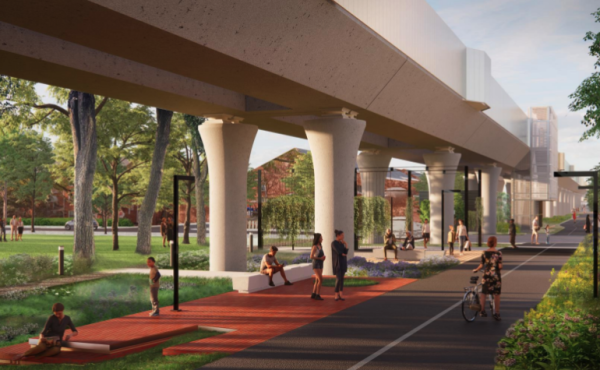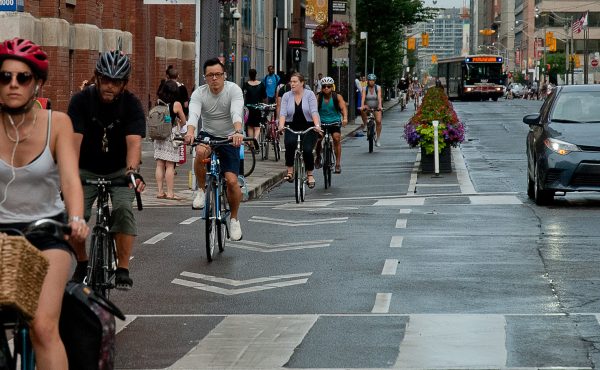Toronto’s City Manager has sent a proposal to City Council’s executive committee for their April 20 meeting that seeks to eliminate most citizens’ advisory committees (PDF), including the Pedestrian Committee, the Cycling Committee, and the Task Force to Bring Back the Don.
Citizens’ advisory committees, made up of citizen volunteers with some representation of city councillors and school boards, play an important role in getting city staff and city council to pay attention to issues that they might otherwise neglect. Eliminating them will serve to further isolate City Hall from the citizens it is supposed to represent.
Nor is there any benefit to eliminating advisory committees — they don’t cost any money (the report notes there would be no financial implications for this move), they only take up a few hours of staff time a month, and they benefit the city with the unpaid work of committed citizen volunteers.
I should state up front that I am very interested in this issue, as I have been a member of the Toronto Pedestrian Committee for seven years and its co-chair for four years. However, my term is up and, if the committee continues, I would be leaving is as soon as new members and co-chairs are chosen.
Citizens’ advisory committees give citizens a greater voice in the affairs of City Hall in a couple of ways. First, the committees can talk directly to city staff and can send motions to council standing committees, putting issues directly on the city hall agenda. Without the committees, citizens are dependent on either finding a councillor who is willing to take interest in the issue and add it to their busy schedule, or hoping that city staff schedule some kind of consultation on the issue. Both councillors and staff already have their own issues, and both have to take internal political considerations into account that limit the number of initiatives they bring forward. Advisory committees make it possible for citizens to get issues on the agenda that are important to the city’s inhabitants, but might not be at the top of the political agenda.
Another big advantage of citizens’ advisory committees is that they can work with relevant staff over an extended period, in a public and transparent manner. Normally, citizen consultations are on a specific project, happen here and there, and then are over. There is not a lot of scope to work on an an issue with city staff over the long term and make sure the issue stays on the radar and that there is continuous improvement. Advisory committees, by contrast, can track an issue, and can arrange meetings with staff in all relevant parts of the city bureacracy.
An example from the Pedestrian Committee is the issue of clearing downtown main street sidewalks of snow and ice. Despite their heavy pedestrian traffic, for a long time clearing snow from the sidewalks of main streets downtown was left to property owners. The result was busy sidewalks that were intermittently blocked or icy, and huge puddles of melting slush at the corner of intersections with blocked drains after snowfalls. The Pedestrian Committee pressed staff on this issue during recent winters with heavy snowfalls. As a result, the city started systematically ploughing the sidewalks of main streets downtown soon after major snowfalls, greatly improving pedestrian safety (we still need to work on ploughing downtown residential streets).
This was not really a council issue — it was something that we brought to the attention of staff, and staff were able to address it without having to send it to city council. It was having an advisory committee that made this process possible.
The City Manager proposes other kinds of mechanisms for consultation, but none of them would have the kind of direct access and well-established long-term existence that makes advisory committees effective.
Nor is it true that simply having a City strategy in place means that a committee is no longer needed. As we all know, the City of Toronto has many excellent plans and strategies that are never actually implemented. Advisory committees help to monitor them so that, once a strategy has been created, it actually gets implemented.
Some advisory committees do become dormant, and if they do, that’s a good sign that it’s time to wrap them up. But the current proposal also seeks to eliminate committees that it admits are still active and relevant.
Citizens spent a lot of time and effort getting these committees established in the first place, and have spent a ton of time and effort making them work. Many survived amalgamation and successive mayoral regimes. It is a huge waste to simply cast away that accumulated work without thought.
Toronto’s tradition of active citizenship is one of its key assets. It makes sense to harness that resource, not ignore it.




16 comments
Dylan, Thanks for your commitment to pedestrian issues in this city for so many years.
Sadly, some of the impetus for this may come from the staff who, in certain parts of the bureaucracy, don’t particularly welcome citizen involvement. Any way it can be marginalized (even more than it is by this two-headed mayoralty) aids their agenda which is to be left alone to do as they please.
The Union Station advisory group (which goes from being merely ineffective to non-existent) was a perfect example of this — managed “involvement” that had absolutely no political effect. The Council “member”, Lindsay-Luby, was happy to take credit for the project when it suited her, but didn’t attend the meetings and was unaware of our ongoing problems with staff.
We met in a room hidden away in Union Station behind a locked door bearing a sign “beware of the leopard”. Well, not quite, but it seemed that way, and the door was locked. So much for public participation.
What a drag. This really doesn’t make any sense at all. I hope Rob Ford realizes the value provided by these volunteer committees and decides to keep them instead.
Yeah, that’s probably better – corrected.
Whether one agrees or not that these committees are a good thing, I think it’s a little disingenuous for supporters to say that the selection process was “democratic”.
Samg – no-one in this thread has said that. They do provide an avenue for citizen engagement with the city government, though.
Kicking volunteers off of committees that do work for free. Isn’t this the opposite of the Big Societyness going on accross the pond?
Conservatives are not made equal. Unfortunately, we just elect the dumb ones.
These committee cuts are service cuts, and they are cuts in access and democracy.
I know from the decade-plus of my time on varied cycling committees that at times they were less helpful, and usually not well heeded, and this was a bit worse in the last four years under Miller/Heaps, but having a committee was still a better thing than not to have it.
Like the TTC, the Exec Cttee does not have any downtown core reps on it, so we’re tending to be shut out from it all, and this includes under a week’s notice of the meeting and the cuts.
Steve’s point about how the staff don’t like accountibility and citizen pressure is also valid – I’m still awaiting a response from head bike guy Dan Egan as to why we can’t have coloured paint on our bike lanes here in Caronto.
Please consider filling up the Exec Cttees meeting time.
As a founding member of the TORONTO PEDESTRIAN COMMITTEE (and that body’s longest serving member ever) one hopes these citizens’ committees will continue to exist. They provide a way for our City to benefit from the street-level perspective of we regular TORONTONIANS, and not just the elite few whom the various mainstream political parties have positioned to represent us.
Yet another example of the Fords’ desire to rule by diktat.
Dylan,
Your point is noted. That said, the key theme being splashed across the media regarding this story is that somehow this move is undemocratic. I agree that citizen engagement is important… but that should be engagement of all citizens… not just a chosen few. I’m sorry, but I don’t agree with the premise that the members on these committees provide the perspective of “regular Torontonians” as Scott above suggests. What exactly is a “regular Torontonian”? I’m not saying the committees were a good or bad… but I am challenging the premise that they are about providing input from regular Torontonians.
I guess a regular Torontonian would be one who does not have easy access to city hall politicians and staff (the access a politician, lobbyist or expert might have). The advisory committees made it possible for those kinds of people to have a stronger voice than they could otherwise have.
Dylan, would have to disagree with you since many of the these committees seemed to be stacked with people particular councillors wanted on the committee. The advisory committees made it possible for SOME regular people to have a stronger voice… but not all…
SAMG: that’s completely false that committees are stacked the way a councillor wants them. having volunteered over the last 15 for these committees I was interviewed only by staff and a citizen representative, not a single councillor.
That’s not to say advisory committees that spring up due to an issue (TTC customer service, for instance) don’t get reps that a councillor wants, but those too are approved by committee members which tend to have multiple POVs.
Gazing with amazement at the reign of Rob and Doug Putin from my safe perch here in New York. Sorry guys, you’re really in for a rough couple years.
Moya, sorry but I still stand by my comment. Many of these committees did “seem” to be stacked with people particular councillors wanted. Again, I’m not saying these committees were a good or bad or whether their mandates have been fulfilled. I am underlining that they were a way for SOME citizens not all to have input on some city wide issues. The crucial matter is whether ALL citizens are entitled to be consulted, especially with respect to important changes in their neighborhood. It’s with respect to the latter that I think the City has been particulary negligent. In my own ward (18), I would say that residents could expect to receive consultation to the degree that they were affluent, artsy or trendy. The rest of the Ward had to make do with “door to door surveys” conducted by the councillor which nobody seemed to be aware of.